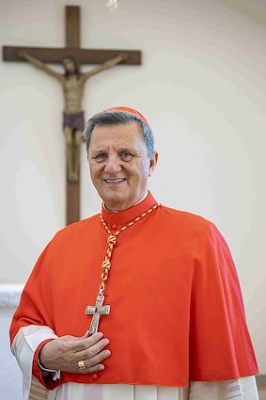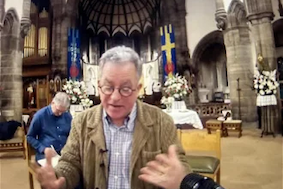Cardinal Mario Grech: The danger of keeping silent

Cardinal Grech - Wiki image
Cardinal Mario Grech, Secretary General of the Synod of Bishops, gave the following homily at the opening Mass of the conference on Synodality in Campion Hall, Oxford, on 23 March 2022.
There is 'a time to keep silence, and a time to speak'. These words, as you well know, are not my own. They are taken from the book of Ecclesiastes, 3,7. There is a time for silence and a time for words. The two go together: there is not one without the other. A time of silence without a time to speak, as well as a time to speak without a time for silence lead to unpleasant consequences. Silence should lead to speech, and speech should lead to silence. Speech without silence easily becomes hollow words. Silence without speech can easily lead to a state of apathy and irresponsibility.
Unfortunately, the church is not an exception. Often, it has spoken where it should have remained silent. And, often, it remained silent where it should have spoken. I'm not referring here to the Church's engagement ad extra, with the external world, although what I am saying is also applicable to this realm. Often, the Church could have been more vociferous in its fight for justice, in its defence of the poor, but chose to keep its mouth shut. On the other hand, often the Church should have been more prudent, but chose to speak and speak too much. Sadly, this is all true. However, I wish to focus on the Church's engagement ad intra, with itself and the different realities that constitute it. I wish to focus on the culture of silence in the Church, on those internal problems about which the Church should have spoken but chose, because it was convenient, to remain silent. There are problems, issues, within the Church about which we choose to remain silent rather than speaking. The clearest example which comes to everyone's mind is the sexual abuse crisis that the Church went through and is still going through.
Unfortunately, this is not the only instance of a problem in the Church about which we choose to remain silent. What about the general silence concerning the deep divisions within the Catholic church? Between conservatives and liberals? Between those who exclusively want the ordinary form and those who want the extraordinary form? What about the political divisions in the Church? What about the divisions between the local Churches in the global west and the local Churches in the global south? What about the continuous struggle to make the priesthood of the baptised work hand in hand with sacramental priesthood? What about the role of women in the Church? How can one explain we have Catholics who want to exclude certain categories from our pews? These are all issues in the Church about which we rarely have a frank and open discussion. These are issues which we all acknowledge to be present but about which we prefer to remain silent. Or, even worse, choose to raise these issues within smaller groups made up of people having a common opinion. Rather than having an open, frank, discussion, we end up in a Church made up of cliques. Rather than dialogue, we have a culture of us against them. The Church should speak about these issues, but often chooses to remain silent.
In today's Gospel Jesus drives out a demon that was mute. I think that this is a very interesting detail, especially considered in light of what I have already said. The demon prohibits the possessed man from speaking. He forces him to remain silent. Silence at a time when speech is needed, is a sign of evil, a sign of the devil. When we choose to remain silent, rather than speak, because it is more convenient, we are collaborating with this evil.
In the coming days, we will be discussing and reflecting on the synodal process that Pope Francis has just inaugurated. Many people have doubts about the synod, many people think that it is a big risk. Many people are wary of the dangers that this process might bring. I understand these preoccupations. But, perhaps, we have not quite understood what the synodal process is all about. This is not a process of revolution: the pope does not want to change the Church into something that it is not. This is not a wiping out of tradition. This is not a process of democratisation. Rather, the synodal process is a time for speech. A time to let the voice of the Church speak and bring forward the issues, the problems that inhabit our synodal Church. For a long time, we chose to remain silent, but now it is time to speak. It is time for the local Churches to voice their concerns. It is a time to let the liberal and conservative sides of the Church to speak, frankly and openly, and air their concerns. There is a time to remain silent, and a time to speak, and the synodal process is privileged time and space in which the inner voice of the Church is allowed to speak, a time and space in which the Holy Spirit is allowed to speak, through the different organs of the Church. For a long time, we chose to remain silent, now it is time for the polyphony that constitutes the Church to be played …and don't be surprised if there are some false notes along the way.
I speak of false notes because I recognise and acknowledge the fact that this synodal process is not easy. It is not exempt from mistakes, human weaknesses, misinterpretations, confusion. Even Jesus' good deed, his miracle in today's gospel, was misinterpreted, created confusion, was mistaken for an act of the devil. This is all true. But remember, there is a time for silence and a time to speak. Or rather, there is a time to speak and a time for silence. The synodal process is not only a time to speak but a time for silence. Our speaking about the issues of the Church needs to be accompanied by a time of silence, a time of discernment, a time to make sense of what will have been said, a time for the pope, the bishops and the Church to meditate on what was heard and to find the path forward. To keep silent when one is supposed to speak, could be diabolic, but to keep silent after having had a time to speak is divine. This is the holy silence that should accompany the synodal process. And only this silence that comes with the time to speak, will help reduce mistakes, incomprehension, confusion.
There is a time to keep silent and a time to speak. This is what Ecclesiastes says. This is what the synod will endeavour to do. This is what we should all endeavour to do, for we are all part of this synodal process. Let us not keep silent, when we are called to speak. May the voice of the Spirit within us speak. But also let us not speak, without keeping silent. Only this silence will help us understand that the words that the Church speaks are not only the words of men, but the words of God.


















